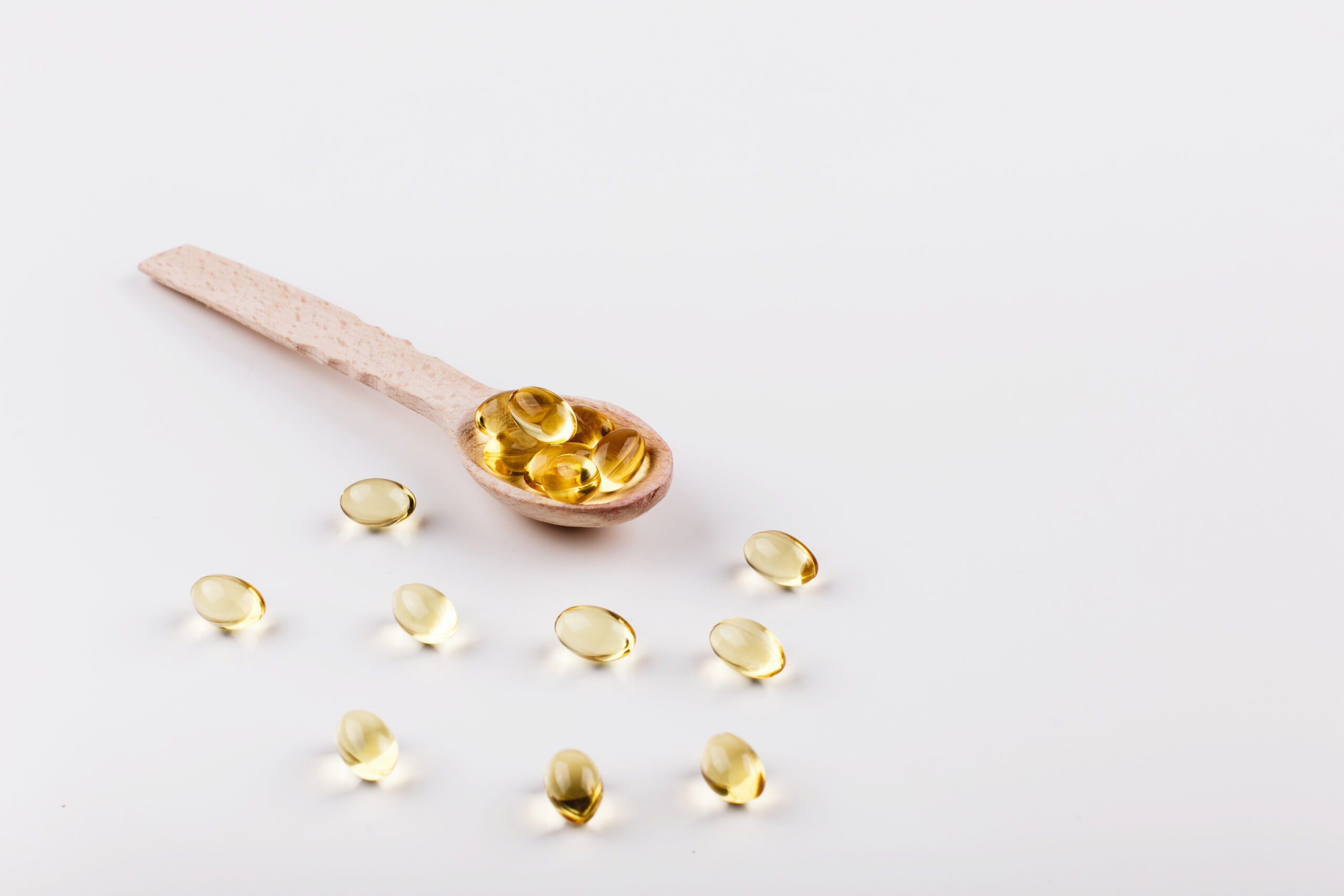Omega-3 fatty acids belong to the group of polyunsaturated fatty acids. It means that in one molecule of omega-3 fatty acid, the last double bond in the carbon chain is located on the third carbon atom from the end.
The compounds are not synthesized in the human body, but those supplied with food can undergo enzymatic transformations. During this process, physiological substances necessary for the proper functioning of the body are produced.
Omega-3 acids are compounds that are an essential element of everyday nutrition. A balanced and well-composed diet of a healthy person should meet their energy needs and contain all the ingredients necessary for the proper functioning of all organs, development, and health maintenance.

Omega-3 and omega-6 fatty acids![]() are classified as essential fatty acids (EFA). Human organisms cannot create these substances on their own. It is particularly significant to maintain their balance in the body. For this reason, it is recommended that the ratio of omega-6 to omega-3 fatty acids in the diet be a maximum of 4:1.
are classified as essential fatty acids (EFA). Human organisms cannot create these substances on their own. It is particularly significant to maintain their balance in the body. For this reason, it is recommended that the ratio of omega-6 to omega-3 fatty acids in the diet be a maximum of 4:1.
Omega-9 acids![]() , in turn, are monounsaturated acids, which means they have only one double bond. It is located on the ninth from the end omega carbon atom in the fatty acid molecule, hence the number in their name.
, in turn, are monounsaturated acids, which means they have only one double bond. It is located on the ninth from the end omega carbon atom in the fatty acid molecule, hence the number in their name.
There are different types of omega-3 fatty acids. They vary primarily in their chemical configuration and the natural origin from which they come. The most important of them include:
Omega-3 acids have strong health-promoting properties![]() and are therefore worth including in your daily diet. Experts explain that these compounds demonstrate:
and are therefore worth including in your daily diet. Experts explain that these compounds demonstrate:
Some studies have also shown the role of omega-3 fatty acids in the treatment of attention deficit hyperactivity disorder (ADHD). They also have an antidepressant effect and help reduce the incidence of chronic inflammatory diseases. However, these matters require further clinical investigation.
These compounds participate in the blood clotting process and have anti-inflammatory and antioxidant properties.
As mentioned earlier, the most popular compounds from the omega-3 group include alpha-linolenic acid (ALA) and long-chain acids: docosahexaenoic acid (DHA) and eicosapentaenoic acid (EPA). Two types in particular during pregnancy![]() play an essential role in the development of the fetus and the health of the mother.
play an essential role in the development of the fetus and the health of the mother.
Future mothers should be aware that DHA is needed by the fetus not only in the mother's womb but also when the child is growing and developing intensively. Initially, it is supplied through the placenta and later during breastfeeding![]() with mother's milk. This ingredient primarily determines the proper development of the child's nervous system. For this reason, it is worth supplementing it, especially in the second and third trimester of pregnancy, when the fetal brain develops intensively. Additionally, DHA influences later mental development and motor and cognitive functions and reduces the risk of developing allergies in a child. A deficiency of this compound in a toddler's diet may result in later problems with concentration and acquiring new skills.
with mother's milk. This ingredient primarily determines the proper development of the child's nervous system. For this reason, it is worth supplementing it, especially in the second and third trimester of pregnancy, when the fetal brain develops intensively. Additionally, DHA influences later mental development and motor and cognitive functions and reduces the risk of developing allergies in a child. A deficiency of this compound in a toddler's diet may result in later problems with concentration and acquiring new skills.

It is also worth knowing that DHA is an essential building block of the retina. It thus ensures the proper development of the child's visual system. Its deficiency may cause vision disorders in children and also cause retinopathy of prematurity, which may even lead to complete loss of vision.
In addition to its beneficial effect on the child's development, DHA is also necessary for the future mother's body because it reduces, among other things, the risk of preeclampsia or postpartum depression.
The most common symptoms of omega-3 deficiency in the diet include:
There may be many causes of these symptoms, so it is worth first determining their cause and then effectively eliminating it. However, if further suspicions are ruled out, supplementation with omega-3 acids is worth it.
It is very challenging to create a situation in which there is an excess of omega-3 fatty acids in the body. In principle, it may only occur in the event of gross non-compliance with the recommendations contained in the leaflet. An inappropriate ratio of omega-6 to omega-3 fatty acids is much more common.
If you have consumed too much omega-3 fatty acids, it is possible to experience diarrhea, as it is a consequence of consuming excessive amounts of fats. People taking anticoagulants should also be careful when supplementing omega-3 fatty acids![]() because these compounds in too high doses may intensify their effects.
because these compounds in too high doses may intensify their effects.
Use caution and do not use large doses in people with hemophilia or bleeding disorders. The possibility of prolonged bleeding time should also be considered in other patients at increased risk of bleeding. For example, it may happen in the case of surgery. When high doses of omega-3 fatty acids are used in patients with coagulation disorders taking anticoagulants, coagulation parameters should be monitored, and the dosage should be adjusted if necessary.
Moreover, liver function parameters should be monitored in people with hepatic impairment taking high doses.
Specialists have not been advised for omega-3 fatty acids, except for ALA. The daily dose of omega-3 fatty acids depends on many factors, including age and gender.
| Life Stage | Recommended Amount of ALA |
| Birth to 12 months | 0.5 g |
| Children 1–3 years | 0.7 g |
| Children 4–8 years | 0.9 g |
| Boys 9–13 years | 1.2 g |
| Girls 9–13 years | 1.0 g |
| Teen boys 14–18 years | 1.6 g |
| Teen girls 14–18 years | 1.1 g |
| Men | 1.6 g |
| Women | 1.1 g |
| Pregnant teens and women | 1.4 g |
| Breastfeeding teens and women | 1.3 g |
If you don't know what dose of omega-3 fatty acids will be best for you and wonder whether supplementation is necessary, go for a dietary consultation and talk to a dietitian about your doubts.
According to Food and Drug Administration (FDA) experts, daily consumption of up to 3 g of omega-3 fatty acids is generally acknowledged as safe (Generally Recognized As Safe – GRAS) and is not associated with significant side effects. You also need to remember to choose oils with good-quality omega-3 acids.
The amount of EPA and DHA acids and their proportions depend, among others, on the species of fish, their physiological condition, the season in which the fish is caught, and the place of fishing.
Omega-3 acids should be obtained from small fish because they accumulate much less heavy metals due to their short lifespan than large fish. We should also choose products made from fish caught in certified water reservoirs. Recommended places for fishing are the seas of the Northern Hemisphere (especially the Arctic Ocean), where the industry is not that developed, which means smaller water pollution.

Due to the ease with which fish oil can undergo oxidation processes that are harmful to health, the production conditions and the time from catching the fish to obtaining the oil are significant. Ideally, the time from catch to fish oil production should be less than 36 hours.
What's more, the lighter the color of the oil, the higher the quality of the product. It means it does not become rancid and will not generate any damaging side consequences. Remember that fish oil should have a delicate, fresh scent. If it smells too strongly of fish, it may indicate rancidity and low quality of the raw material.
Omega-3 acids contained in the product should be triglycerides (TG), i.e., in the same form as in fish, so they should not be concentrated. Choosing products certified by recognized organizations that set quality assessment standards is also worth choosing.
With this in mind, it should be mentioned that the TOTOX factor![]() tells you how fresh the omega-3 supplement is and how stable the fats it contains. When determining it, the number of oxidation-related by-products in the preparation is checked. TOTOX should be less than 25, but the lower this value is, the better for our health. Find information about the TOTOX index on the manufacturer's website or on the websites of independent foundations that evaluate dietary supplements, such as IFOS (International Fish Oil Standards).
tells you how fresh the omega-3 supplement is and how stable the fats it contains. When determining it, the number of oxidation-related by-products in the preparation is checked. TOTOX should be less than 25, but the lower this value is, the better for our health. Find information about the TOTOX index on the manufacturer's website or on the websites of independent foundations that evaluate dietary supplements, such as IFOS (International Fish Oil Standards).
You can buy omega-3 supplements in capsule or liquid oil form. We should decide for ourselves which form will be more suitable for us. Moreover, numerous studies show that the liquid form is more susceptible to oxidation and may lose its properties faster. The conclusion is that capsules probably provide better protection for the product.
Remember that capsules with omega-3 acids may have different sizes. We also choose dark packaging products that allow as little light as possible because omega-3 acids are sensitive to oxidation under the influence of sunlight.
We would also like to point out that unpleasant belching after consuming an omega-3 supplement may indicate that the preparation is stale. However, if the products are of good quality and you still experience burping, other supplements are worth testing.
The main contraindication to using preparations with omega acids is hypersensitivity to any of their components.
Furthermore, caution should be exercised, and large doses should not be used in people with hemophilia or bleeding disorders. The possibility of prolonged bleeding time in other patients at increased risk of bleeding should also be considered. For example, this may be the case in surgical procedures. As mentioned earlier, if high doses are used in patients with coagulation disorders taking anticoagulants, coagulation parameters should be monitored, and the dosage should be adjusted if necessary.
If we suffer from liver failure, liver function parameters should be monitored when using high doses.
It is worth noting that there is a difference between omega-3 fatty acids of animal origin (EPA and DHA) and those of plant origin (ALA). Marine fish are a rich source of EPA and DHA, while some plants provide ALA. The human body can convert ALA into EPA and DHA, but this process is limited, so it is recommended to consume various of sources omega-3.
To avoid omega-3 deficiency in your diet, you should permanently include appropriate products. The richest sources of DHA and EPA fatty acids are: